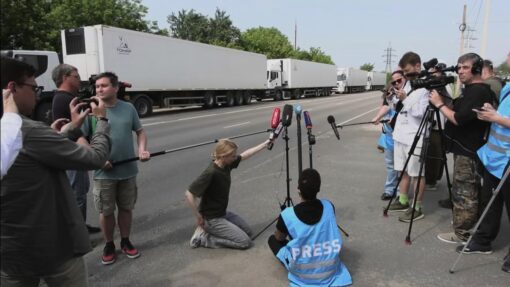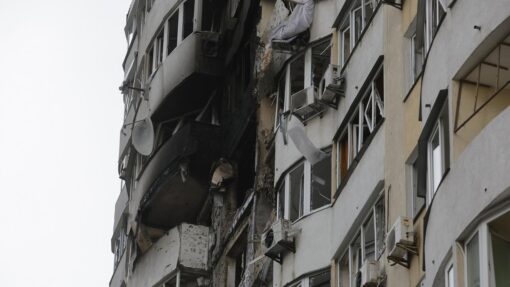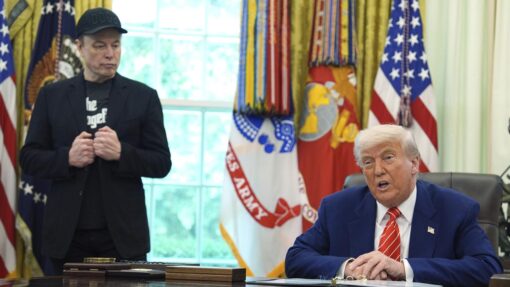Decisive US action could end war next year: Zelenskiy
|

Decisive actions by the United States now could hasten the end of the Russian war against Ukraine next year, President Volodymyr Zelenskiy says after telling an American television network that his country is “closer to the end of the war.”
“Now, at the end of the year, we have a real opportunity to strengthen cooperation between Ukraine and the United States,” Zelenskiy said in a post on his Telegram messaging app after meeting with a bipartisan delegation from the US Congress.
“Decisive action now could hasten the just end of Russian aggression against Ukraine next year.”
Zelenskiy is in the United States for the UN General Assembly. Later in the week he will travel to Washington to present his “victory plan” and influence White House policy on the war no matter who wins the US election on November 5.
In the interview with ABC News, Zelenskiy urged Washington and other partners to continue supporting Ukraine. Washington and its allies have provided a multi-billion dollar assistance program to Ukraine while also imposing several rounds of sanctions against Moscow.
“I think that we are closer to the peace than we think,” he was quoted as saying. “We are closer to the end of the war.”

The full-scale Russia invasion of Ukraine, or “special military operation” as Moscow calls it, began in February 2022 and has killed thousands of people, uprooted millions more and turned Ukrainian towns and cities into rubble.
The Ukrainian leader said only from a “strong position” can Ukraine push Russian President Vladimir Putin “to stop the war.”
Zelenskiy has said very little so far about his “victory plan,” except that it would act as a “bridge” to a second Ukraine-led summit on peace that Kyiv wants to hold and invite Russia to later this year.
The Ukrainian president’s chief of staff, Andriy Yermak, said in New York on Monday that the plan included accelerated NATO membership for Ukraine, something Moscow says it will never tolerate.
Putin says peace talks can begin only if Kyiv abandons swathes of eastern and southern Ukraine to Russia and drops its NATO membership ambitions. Zelenskiy has called repeatedly for a withdrawal of all Russian troops, and the restoration of Ukraine’s post-Soviet borders.
Russia controls about 20 per cent of Ukrainian territory and has been advancing in the east, taking control of a series of settlements in a push to seize the entire Donbas region.
In a bold move to grab back the initiative, Ukrainian troops attacked into Russia’s western Kursk region on August 6 and continue to occupy dozens of villages on Russian soil.
Zelenskiy told ABC News the Kursk operation exposed the weakness of Putin’s position, even though the Russian military continues to advance on its objectives in Donbas.
“He’s afraid very much,” he said. “Why? Because his people saw that he can’t defend – that he can’t defend all his territory.”
On the battlefront, three civilians, including a child, have been killed by Ukrainian shelling of a village in Russia’s Belgorod border region.
Four people were also injured in the attack on the border village of Arkhangelskoye, governor Vyacheslav Gladkov said on Telegram.
“An 11-year-old girl has been taken to hospital and the child’s mother has had both feet amputated,” Gladkov wrote.

The Belgorod region has come under frequent cross-border shelling and drone attacks in the course of the war.
It is adjacent to the Kursk region where Ukrainian forces pierced Russia’s western border last month in an incursion that Russian forces are still fighting to repel.
Meanwhile German Chancellor Olaf Scholz said he will not loosen rules for the use of German weapons in Ukraine’s defensive fight against Russia.
Scholz specified that this included restrictions that prevent Ukraine from firing missiles deep into Russian territory.
“That is not compatible with my personal stance … We will not do that. And we have good reasons for it,” said Scholz, who is in the United States for the high-level week of the United Nations General Assembly.
Zelenskiy has been persistent in his appeals to allies to allow Ukraine to use long-range missiles to hit targets far beyond the war’s front line, including Russian logistics hubs and military bases.
with DPA
Reuters


